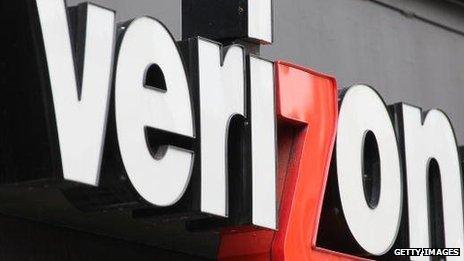Court decision puts the future of net neutrality regulation in doubt
- Published
- comments

Internet providers like Verizon can now charge more for priority access to their service
On Tuesday, a federal appeals court struck down rules put out by the Federal Communications Commission requiring internet service providers to offer equal access to their networks.
The concept, called net neutrality, has been the source of a great deal of debate - in the US Congress, courts and the media. Supporters view it as a way to ensure freedom and fairness on the internet, while opponents call it unnecessary government intrusion on business.
The editors of the Wall Street Journal herald the decision, external as "another judicial rebuke to the Obama Administration's abusive rule-making habits". They contend that internet providers should be able to charge different prices to companies like Youtube and Netflix, which require greater capacity and speed:
This makes no more economic sense than forcing a cable company to charge one price no matter how many channels a consumer subscribes to, or saying a retailer can't charge more for two dresses than for one. It also means less innovation and slower broadband rollout because Internet companies are less sure of their return on investment.
Former FCC Commissioner Robert McDowell contends, external that the government is trying to fix a problem that doesn't exist.
"The FCC never bothered to study the impact that such intervention might have on the broadband market before leaping to regulate," he writes. "Nor did it consider the ample consumer-protection laws that already exist.
He fears that further FCC regulation will encourage international organisations like the International Telecommunications Union to step in, possibly putting control of the internet into the hands of "authoritarian regimes".
Supporters of net neutrality see regulation as a necessary check on internet providers, which in the interest of maximising profits could give preference to big business over smaller, independent web enterprises and start-up companies.
"Internet providers are now free to stop or slow sites and apps they dislike and offer faster access to services they like - an 'upgrade' of the Internet that could make it look a lot more like cable TV, where you pay to get particular channels or bundles of channels," writes, external Yahoo technology blogger Rob Pegoraro.
Users might flock to big sites like Facebook and Google because access is free (at local wifi hotspots) or fast (on their home networks), while ignoring new sites that don't have the deep pockets to buy preferential access.
"Imagine if, years ago, MySpace or AltaVista had cut deals with cable companies to block Facebook and Google," writes, external Slate's Marvin Ammori. "Without network neutrality, telecom and cable companies could also stifle free expression. They'd have the legal right to block articles like this one."
Venture capitalist Fred Wilson imagines, external what pitch meetings in future years could look like, as internet entrepreneurs have their proposals repeatedly shot down because they don't have preferred access to broadband providers.
"We love your idea and would have funded it right here in the meeting back in the good old days of the open internet, but we can't do that anymore," he has one investor saying.
Loyola University Prof John Blevins says "reports of network neutrality's death have been greatly exaggerated", however. He tells the Washington Post's Ezra Klein, external that the appeals court's decision left an opening for the FCC to use its legal authority to "promote broadband deployment" by taking action against internet providers that "abuse their monopoly".
"The court correctly recognized that prohibiting blocking and discrimination can lead to greater broadband deployment by increasing consumer demand," he writes.
Informed Comment blogger Juan Cole believes, external it's time for President Barack Obama to step in, as he owes his 2008 election in part due to "the free Internet":
I am hoping he knows that Fox Cable News could be the future of information if corrupt billionaires like Rupert Murdoch (whose companies have been implicated in spying on large numbers of people's telephone answering machines) are allowed to buy the internet after they already bought the people's airwaves.
Liberals warn of Rupert Murdoch's growing power. Conservatives decry government meddling and faceless international bureaucrats. It all sounds like a typical Washington rhetorical slap-fest, but behind it is a more substantive ideological difference that undergirds many of today's policy debates.
What is the role of government in protecting small businesses and individuals against the power of large companies? There's a long tradition of such interventions, dating back to President Teddy Roosevelt and his early 20th Century battle against monopolies.
But will government intervention cause more harm than good? Many on the right, who have a natural tendency to suspect the unintended consequences of regulation, certainly think so.
In the end, I wouldn't bet against the big corporations prevailing - probably in small, incremental steps that consumers hardly notice. Money usually finds a way.
- Published15 January 2014
- Published12 July 2013
- Published9 September 2013